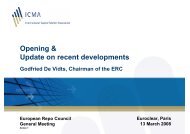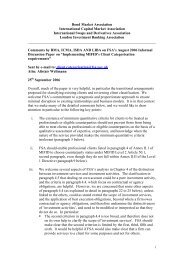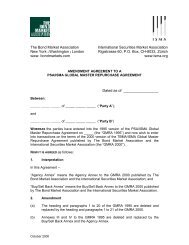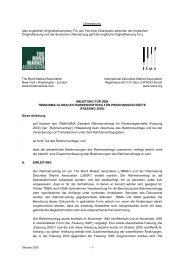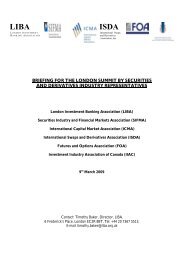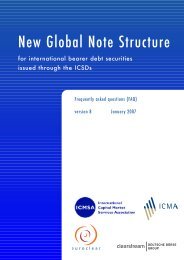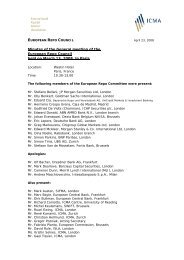Issue no. 22: ICMA Regulatory Policy Newsletter
Issue no. 22: ICMA Regulatory Policy Newsletter
Issue no. 22: ICMA Regulatory Policy Newsletter
You also want an ePaper? Increase the reach of your titles
YUMPU automatically turns print PDFs into web optimized ePapers that Google loves.
to the financial system as a whole and the prospects for the<br />
wider eco<strong>no</strong>my.<br />
Resolving a complex financial institution involves sorting out<br />
which of its parts should be allowed to fail and which parts<br />
need to continue to function and how.<br />
• One option being considered is to create a “firewall” in<br />
the form of a separate subsidiary which contains the<br />
essential activities of the financial institution concerned<br />
and which is ring-fenced within the wider group so that,<br />
if the institution fails, the subsidiary can be taken over<br />
quickly by government at limited cost, and so that the<br />
taxpayer does <strong>no</strong>t need to support the institution as a<br />
whole. But that involves making judgments about which<br />
activities should be included within the ring fence; how<br />
well the ring fence would work in a crisis; and what the<br />
costs would be, in particular whether the cost of capital<br />
would increase.<br />
• Resolving a complex financial institution without cost to<br />
the taxpayer is also likely to involve “bailing in” at least<br />
some of its bondholders and imposing losses on them.<br />
That could increase the cost of raising capital through<br />
the markets in future. Protecting ordinary retail depositors<br />
by ranking their claims above those of other unsecured<br />
creditors may have a similar effect.<br />
Nor is it necessarily clear in a crisis where the dividing<br />
line should be drawn between financial institutions which<br />
are systemically important and those which are <strong>no</strong>t: is the<br />
dividing line the same as in stable market conditions, or in a<br />
crisis are nearly all financial institutions of potential systemic<br />
significance, because of the interdependencies between<br />
them, as appeared to be the case last time? When assessing<br />
new measures designed to make the financial system more<br />
robust without the need for taxpayer support, a key question<br />
is whether they would have prevented the last crisis if they<br />
had been introduced in time, and what degree of certainty<br />
there is that they will prevent the next one, which may well<br />
be different.<br />
International coordination<br />
It is widely accepted in principle (eg in the G20) that<br />
measures for both crisis prevention and resolution need to<br />
be coordinated internationally: through the Financial Stability<br />
Board at global level; the European Systemic Risk Board at<br />
European level; and at national level through committees<br />
like the Financial <strong>Policy</strong> Committee in the UK. These bodies<br />
all need to work together. And there is a broad measure of<br />
agreement at a high level in the G20 about what needs to be<br />
done. But implementing this high level agreement in the same<br />
QUARTERLY ASSESSMENT<br />
way in different regulatory jurisdictions is proving difficult in<br />
practice. Consequently, there is a risk of regulatory arbitrage<br />
between different jurisdictions (eg between the EU, the US and<br />
Asia), and also between the regulated sectors of the market<br />
and the less regulated sectors, such as “shadow banking”,<br />
which are <strong>no</strong>t subject to the same regulatory constraints and<br />
may be less transparent. Heavier regulatory requirements on<br />
the established financial system may even encourage financial<br />
activity to shift to the <strong>no</strong>n-regulated sector.<br />
The need for international coordination also reduces<br />
the scope for national discretion. The scope for national<br />
discretion is particularly limited in the EU, where financial<br />
services legislation is agreed at EU rather than national level,<br />
and new EU authorities – ESMA, EBA and EIOPA – have<br />
been established this year to create a Single EU Rulebook. If,<br />
for example, a national authority were to raise capital levels<br />
for bank subsidiaries in one EU country without them being<br />
raised elsewhere in the EU, foreign banks might be able to<br />
gain a competitive advantage by making use of their lower<br />
capital level elsewhere in the EU and passporting through<br />
their local branches. But removing national discretion in the<br />
EU altogether – eg the discretion to allow national regulators<br />
to impose national requirements above a common minimum<br />
level set for the EU as a whole – would risk imposing a “one<br />
size fits all” solution to eco<strong>no</strong>mic and financial problems in<br />
different countries, which are <strong>no</strong>t all the same.<br />
Finally, the post-crisis regime appears to have strengthened<br />
the need for coordination between central banks and<br />
government, in two ways. One relates to the need for central<br />
banks – even though they are operationally independent<br />
– to work closely with government when interest rates are<br />
close to zero. The other relates to the increased importance<br />
attached to financial stability since the crisis. As a result,<br />
central banks need to achieve twin objectives: <strong>no</strong>t just the<br />
objective of achieving monetary stability by having operational<br />
independence to set short-term interest rates in order to<br />
hit an inflation target; but also the objective of achieving<br />
financial stability, which requires close coordination with<br />
government. These two objectives should be consistent with<br />
one a<strong>no</strong>ther in the longer term, but in the short term they are<br />
<strong>no</strong>t necessarily the same.<br />
The European context<br />
There are two other relevant issues – of particular importance<br />
for markets in Europe – to take into account. One is the impact<br />
of the sovereign debt crisis in Greece, Ireland and Portugal,<br />
which has arisen partly because of overstretched public<br />
finances in these countries, partly because of the degree to<br />
which their public deficits depend on external financing, and<br />
<strong>ICMA</strong> <strong>Regulatory</strong> <strong>Policy</strong> <strong>Newsletter</strong> Third Quarter 2011 | 5




